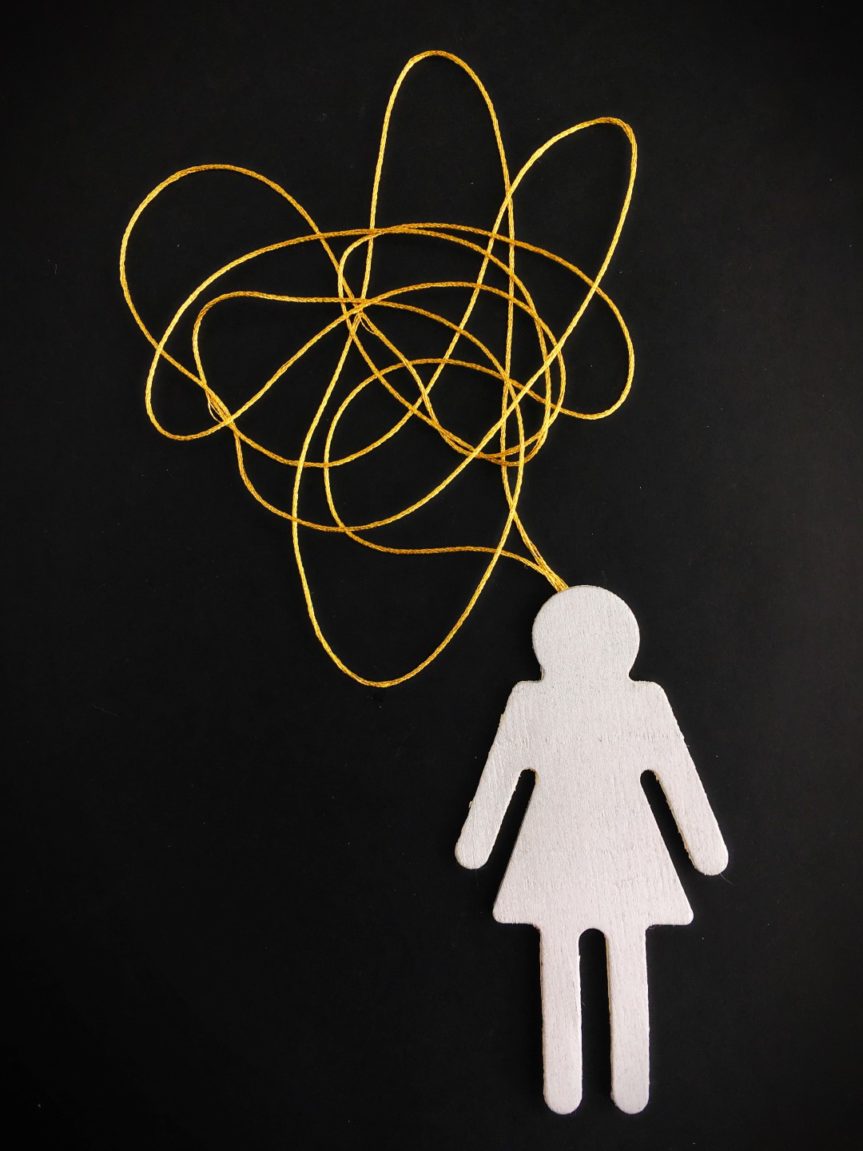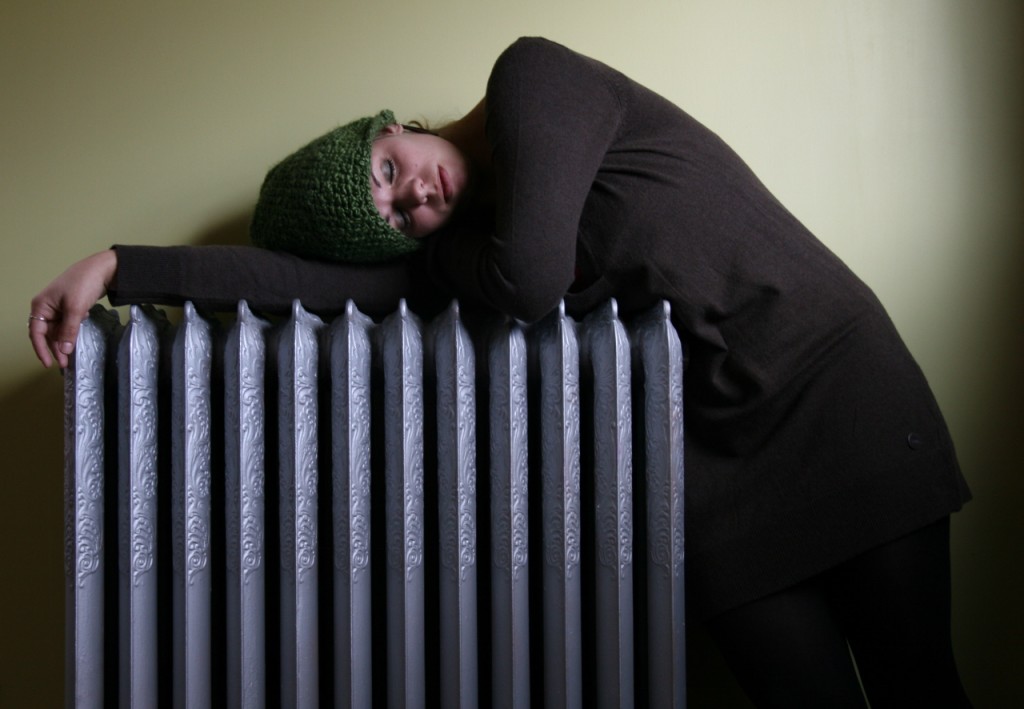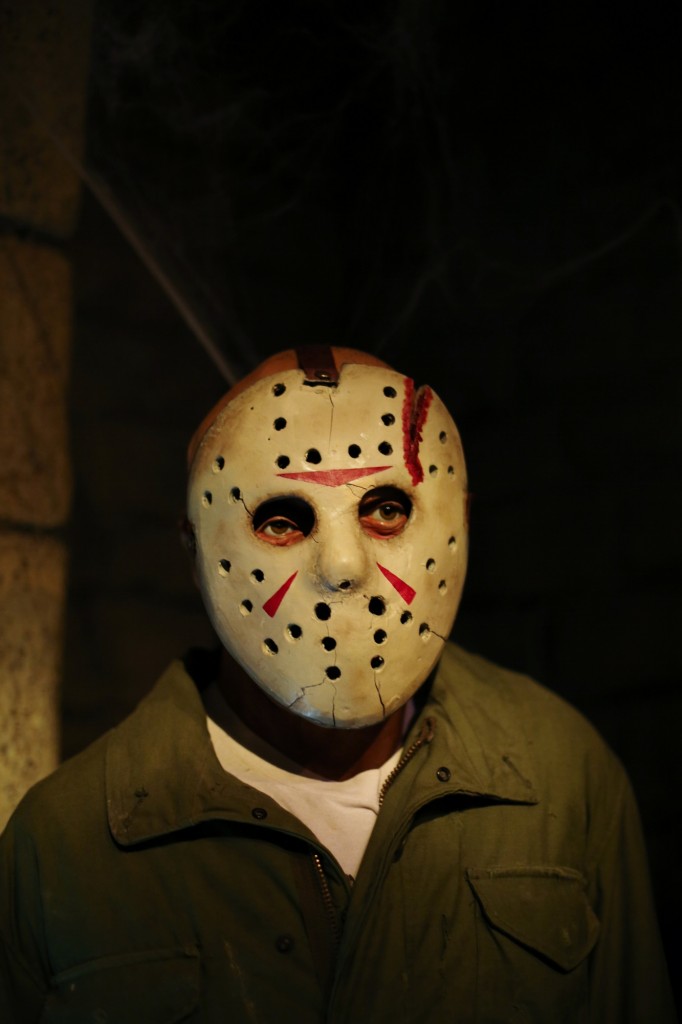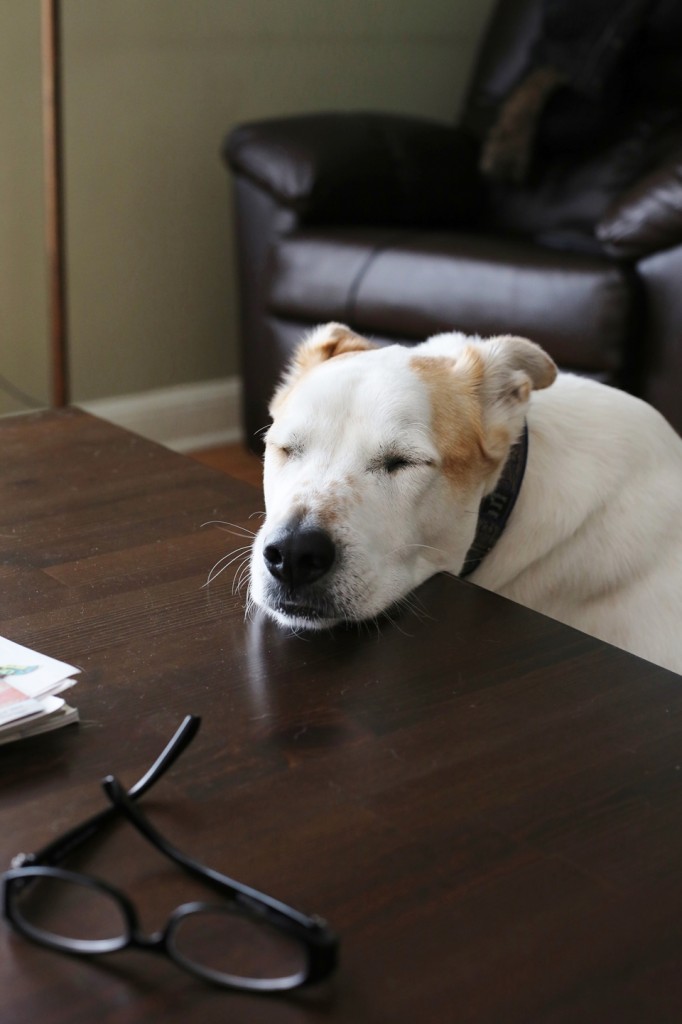Photo by Gina Easley
By Leanna James Blackwell
Nine p.m., the appointed hour. The person who opens the door is a surprise. I’d pictured someone in her sixties, calm and professional, with a tidy bun and a crisp white uniform, a clipboard in her hand and a name tag that says “Marion” or “Florence.” Someone who knows what she’s doing. Someone with steady hands and a soft voice. But it isn’t Marion who greets me, or anyone remotely like her. I consider backing out, but it’s too late for that.
The fact is, I need comfort. I need answers. I haven’t slept through the night in more than a year. Not since, to be exact, November 8, 2016. I’ve become a tightly packed box of stress, shaken and furious after every White House tweet and new revelation about sexual abusers in Hollywood, in government, in the media. My phone notifications are a constant trigger; my long-ago post-traumatic stress diagnosis, the legacy of a past laced with violence and sexual abuse, is suddenly relevant again after years of relative peace. Before the election, I had a pretty good routine. Morning meditation and writing before work, gym several times a week, anti-depressants and Vitamin D, regular therapy and a wholesome “eating plan”—my life so damn virtuous it would have bored the habit off a cloistered nun.
After the election, my routine wasn’t cutting it. Night after night, sleep evaded me. I laid awake, churning. I could run screaming into the streets—and did, with thousands of others—but you can’t march every day. I’d have to step up my daily plan.
- Melatonin. (It works, but only for a few hours. By three a.m., I’m up.)
- Chamomile tea. (I have to drink pots of the stuff to get sleepy. Then I’m up all night peeing.)
- Warm milk. (One word: revolting.)
- No electronics for two hours before bed. (No difference.)
- Books about English gardening. (I remain awake but in a state of clawing boredom).
- Soothing audio recordings. (“Rain” sounds like a dripping faucet; “waves” induces mild nausea.)
My efforts only resulted in a series of hollow-eyed mornings and a fatigue so deep I spent my days feeling like a sluggish fish, lurking depressed at the bottom of a slow-moving river. Finally, my doctor ordered an overnight test at a “sleep medicine clinic,” which has led me to a nondescript building on a side street next to a real-estate office.
Is this really a clinic? Am I the only patient here? The guy waving me inside is twenty-five if he’s a day, tall and gangly, with unconvincing facial hair, baggy blue scrubs, and a super-casual vibe. I half expect to find a bunch of his friends sitting inside on a saggy couch, passing a bong. His name tag says “Brad.” Where’s the sleep clinician? Maybe Brad is the greeter, like in Walmart, and then the clinician comes in?
“How ya doin’? Everything good?” Brad lopes ahead of me down the hall. We pass a brightly lit room with a bank of computer screens at which another guy in a bulky hoodie appears to be dozing.
“Fine, thank you. And you?” When I’m anxious, my mother’s manners kick in big time. I’d remember to say “please” and “you’re welcome” in a fire.
“You can change in there,” Brad informs me, gesturing toward the open door of a bathroom—sink, toilet, wastebasket, harsh overhead light. “Once you get in the sleep room there’s a camera on you, so you wanna get your pajamas on before.”
A camera? No one told me about a camera! Will it be on all night? On me? Who watches it? Will it be live-streamed? Brad laughs—you’re one funny lady—and explains that he will watch it, along with the other dude. It’s just procedure. Making sure I’m not sleepwalking, tearing out my wires, falling off the bed…trying to escape. He doesn’t actually say “trying to escape” but I suspect that’s the real point. Or something worse. But I can’t think about it. If I think about it, I’ll never go through with this.
In the bathroom, I brush my teeth and change quickly into my sleep clinic outfit: an oversized tee-shirt, pair of old yoga pants, and woolen socks. Brad waits for me down the hall. My hands are damp. My heart is jumping. Summoning my courage, I exit the bathroom and creep boldly into the testing room, which is tricked out Holiday Inn–style. Carpet, curtains, dresser with lamp, framed print on the wall (boats), and queen-sized bed with coverlet in a queasy pattern of peach and blue swirls. The only difference is the absence of a window—I check the instant I walk in—and the infrared camera mounted on the wall in the corner. I turn my back on it, a brief moment of middle-aged rebellion.
“Everything good?” This must be Brad’s signature phrase.
“Okay.”
“Great, great. Just sit here on the bed and we’ll get you hooked up.”
“Hooked up” means just that. An electronic box, about the size of a loaf of banana bread, sits on the bed waiting for a thicket of wires to be attached to it. But first, the wires need to be attached to me. All over my body. My skin seems to tighten in resistance, as though trying to harden, like a protective hide. I would like to be a rhinoceros during this procedure. No one fucks with a lady rhinoceros. The last hope for Marion, the matronly clinician, flickers and dies. Eyes closed, I stiffen as wires are snaked down my pants leg—both sides—and attached with sticky pads to my chest, to my lower and upper back, my neck, my wrists, and all over my head, 72 different-colored wires in all. Are there 72 colors? What are the wires doing? To calm myself, I make conversation during the ordeal, the kind of chat you might have with a fellow guest at your cousin and his wife’s anniversary party. Except there’s no punch bowl or cheese platter.
“So, how do you become a sleep medicine clinician? Is it a branch of nursing or physical therapy or something…?” I hear myself emphasizing medicine, as though by saying it I can make this place feel more like a clinic and less like the weirdest motel in America.
“Nursing! Nah.” Brad chuckles at the idea. “You just do this two-week training and figure out which wires go where. It’s pretty hard at first”—he’s concentrating on the purple wire now, which is snaking around my arm—“but then you kinda get the hang of it.”
Kinda is not reassuring. “What were you doing before?” Brad’s professional history has become extremely important to me.
“Working at Antonio’s. You know it?”
As a matter of fact, I do know Antonio’s. The place is a mile from my house. Many a Friday night we’ve had their pizzas delivered. A month ago, Brad easily could have stood on my front porch, handing over a large sausage and mushroom pie and pocketing my husband’s tip before jogging back to his white delivery truck. “Thanks for the fiver, dude. Have a good one.”
And this is the trained professional who will be watching my movements on camera. This is the clinician who supposedly knows what all these wires do and how to read the information that will be fed to the computer screens as I sleep.
Sleep! Who can sleep like this? I’m now fully encased in a tangle of wires, including a clip-on thing on my index finger and two little clips pinched inside my nose. The camera watches me clamber awkwardly under the covers. Then I’m lying on my back, staring up at Brad. He stares down at me, looking for all the world like a bumbling young dad ready to tuck in his kid. I almost expect a bedtime story. Or a prayer. A prayer might not be a bad idea.
“Brad?” My voice squeaks.
“Yeah?”
“What if I have to go to the bathroom?”
“Just call me.”
“How? Is there a button?”
“Nah, just yell my name. I’ll hear ya. I’ll be in the other room looking at the computer.”
Just yell his name? I imagine lying immobile, held down by wires, bladder full, shouting “Brad! Brad!” into the darkness.
“Well, g’night!” Brad ambles from the room, shutting the door behind him. I catch a glimpse of the person in the hoodie, still slumped, motionless, in front of the computer screens. Is he even real? Maybe he’s some kind of sleep clinic mannequin. Or robot. A sweatshirted robot that used to toss pizza dough at Antonio’s. Anything is possible. The screens will display my brain activity and my movements—do I thrash around, kick, sleepwalk, try to ride a bicycle in my sleep? Do I lie there like a mummy? Do I fall immediately into REM sleep (as if), do I wake up fifty times a night, do I stop breathing? If the test shows that I stop breathing, I’ll be prescribed an apnea mask to wear over my face at night. It’s called a CPAP and looks like something an astronaut would wear on a discovery mission to Pluto. I resolve to breathe.
Now Brad’s voice comes crackling out of the speakers in the room. “Just a little test before you go to sleep. Okay? Move your eyes to the left.” My eyes obey. “To the right. Up. Down. Around.” Then it’s time to test my voice. The reason for this is not explained. “Say the word milk five times.”
“Milk?”
“Yep, milk.”
“Uh. Okay.” By the end of five “milks,” I’ve dissolved in semi-hysterical laughter. The weirdness keeps increasing. Why “milk”? Why not “leaf” or “stick” or “dog”? Are we supposed to think of being babies? Will I be given a bottle next? I might accept it. Especially if it has brandy in it.
Then I hear another voice, coming from the other side of the hall. Someone else is being instructed to move their eyes and repeat the word “milk” like an imbecile. Someone else, in an identical room across the hall, is wrapped in wires and unable to get up. A mystery sleeper! I wonder who it is. A stressed, pissed-off writer/academic/mom with PTSD like me? Any or none of those things? It doesn’t matter. A sleepless plumber, an anxious accountant, whoever it is, we are united. I imagine communicating telepathically with mystery sleeper. We could talk until we fell asleep, two strangers in pajamas at the oddest sleepover in the world.
“Are you asleep yet?”
“No, are you?”
“No. Wide awake.”
“Do you believe cats have souls?”
We’d talk for hours until one or both of us managed to drop off.
But no answer comes when I signal hello with my mind. Mystery sleeper has his or her or their own thoughts and problems. I’m on my own. And I’ve got to sleep. The test won’t work if I don’t sleep. My body lies rigid, alert to the knob on the sleep room door. What if it turns in the middle of the night and Brad creeps in? Or the other one? How am I supposed to relax? How could any woman relax, alone and tied down in a faux motel room with male strangers right across the hall who have total access to her room?
I lie in the bed, remembering things I don’t want to remember. Times I was touched, grabbed, patted, squeezed, felt up, held down, much more and much worse, by male relatives and boys in the schoolyard and guys on dates and bosses at work and men on the street. Men who believed, for the simple reason of biology, that having unfettered access to my female body was their divine right. Men like my grandfather, who installed a swing in the barn and invented a game for just the two of us when I was four. We had to play the game each time my parents left me there for a visit. Men like the boyfriend of the woman whose son I babysat on Friday nights when I was thirteen. He always drove me home but didn’t like to let me out of the car once we got there. Men like the guy in a business suit who picked me up hitchhiking one day (I know, I know) when I missed the bus. He accelerated past the high school, unzipping his pants. I jumped out of the moving car and landed on the curb, my backpack saving my skull.
And now, men like the ones running, unimaginably, our godforsaken country. Who have dug up the past from the dark soil of history—what I thought was the past—and flung it back into the present.
It’s chilly in the room but I’m sweating bullets. What doctor could possibly think this is a good idea? I’m going to sue him when I get out of here.
It’s not long before the door knob turns. My breath stops. A dark shape is standing over me. My heart thumps out of my chest and vaults through the roof.
“Sorry,” Brad whispers. “Your nose wire fell out. I saw it on the screen. I just need to fix it.” He leans over me, delicately adjusts the wire, and tiptoes out of the room. “Sleep well,” he murmurs as he shuts the door. And he doesn’t come back. He’s in the computer room, watching the screens all night, making sure my test goes well. Hours go by, but the door remains shut. Brad, it seems, is not going to hurt me. He’s just a guy. A guy doing his job.
Gradually, my heart slows. Gradually, the sweat on my body dries. Gradually, I start to feel tired. And then, somehow, miracle of freaking miracles, I fall asleep. And I stay asleep until four in the morning, when the army of garbage trucks come, roaring behind the building as though announcing the apocalypse and sending me rocketing from the bed, pulling out several wires. Now I am yelling Brad’s name. I hear his hurried footsteps immediately. When he opens the door, he is grinning.
“Ready to go?”
“Hell, yes!”
At this, Brad actually giggles. “Hey, no problem. You slept for a few hours. I got the data. And you didn’t stop breathing. That’s good news!” He seems genuinely happy for me. I’m happy, too. It’s over. I’ll never have to do this again.
Brad hums as he helps me remove the wires. A couple of them get stuck in my hair and we laugh. But my sleep medicine clinician—by now, he’s earned the title—is patient and calm, untangling me wire by wire until I’m free. Free! I stand up, feeling as liberated as the moment just after confession, when my childhood sins had been pardoned and I could step out of the dark booth, cleansed and holy, and burst out of church into the forgiving sunshine. I throw on my clothes in the bathroom, slip on my coat, grab my bag, and head down the hall. I feel like skipping. There is no sign of my companion in the other room. I hope mystery sleeper had a good night, too.
“Have a good one!” Brad calls as I open the door.
“You, too, Brad.” I mean it. I drive down the silent streets toward home. A few fading stars are left in the sky. There are patches of paste in my hair, and an itchy sensation on my back where a cluster of wires was attached. But hot coffee waits for me, and my husband and daughter. And cat.
I’m intact. I’m all right. I did it.
A week later, I get the results. They are unremarkable. I don’t sleepwalk or talk. I don’t thrash around. I don’t have sleep apnea, so I won’t have to wear the dreaded mask. My sleep problem is something else. “Maybe it’s stress,” the voice on the phone suggests. “Have you tried melatonin?”
Two days after the phone call from the clinic, a far-right candidate for a Senate seat in Alabama—and accused sexual predator of adolescent girls—rides his horse to the voting station on election day, supremely confident of a win. His confidence is misplaced. The candidate’s opponent is declared the winner, the first time a pro-choice liberal has won in that state in a quarter-century.
That night, millions of women sleep through the night.
That night, I am one of them.
•••
LEANNA JAMES BLACKWELL is a professor of creative writing and director of the Bay Path University MFA in Creative Nonfiction. An essayist, theatre director, and playwright, she is a member of the Northampton Playwrights Lab, former artistic director and playwright-in-residence of TKO Theatre and the Inner Stage in the San Francisco Bay Area, and the co-founder and director of The Place for Writers at Mills College in Oakland, California. Her most recent play, Grimm Women—a radical re-imagining of three fairy tales told from the witches’ point of view—was included in 2016 Play by Play Festival in Northampton, Massachusetts, and funded by the Massachusetts Cultural Council. She is currently at work on a collection of essays and a play about race and adoption, New Soul, which will receive a staged reading in September 2018.


 Follow
Follow





